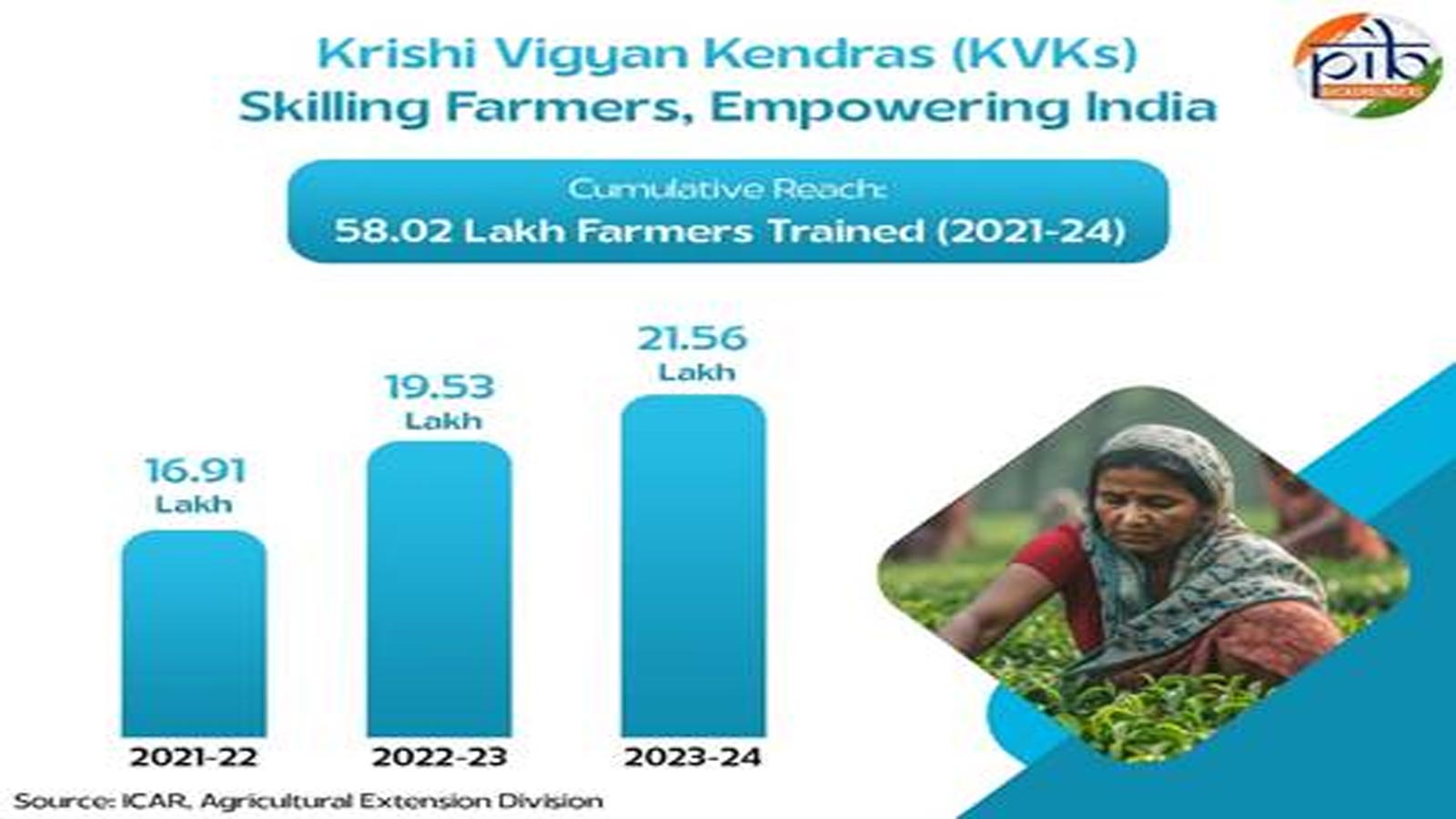Farmer empowerment has emerged as a cornerstone of India’s agricultural strategy, with the government placing skill development and training at the heart of rural development. Recognizing that farmers today face challenges beyond just access to credit and seeds, such as adapting to climate change, managing soil health, using modern machinery, and securing better markets, the government has rolled out large-scale programs designed to build capacities and create a new generation of skilled cultivators. These initiatives mark a significant shift from seeing farmers merely as producers to equipping them as innovators, entrepreneurs, and key players in India’s agri-value chain.
At the core of this transformation lies the network of Krishi Vigyan Kendras (KVKs), established by Indian Council of Agricultural Research (ICAR), which have become frontline platforms for taking research to practice. Between 2021 and 2024, KVKs trained over 58 lakh farmers, with the numbers steadily increasing each year. Farmers received hands-on training, demonstrations, and vocational courses tailored to local conditions in areas ranging from crop and soil management to animal husbandry. This steady scale-up, with 16.91 lakh trained in 2021–22, rising to 21.56 lakh in 2023–24, shows how KVKs are bridging the gap between laboratories and fields, ensuring that science-driven practices are absorbed by farming communities for long-term resilience.
Alongside KVKs, the Agriculture Technology Management Agency (ATMA) has been central to strengthening decentralized extension systems. Implemented under the Sub-Mission on Agriculture Extension (SMAE), ATMA has trained nearly 1.27 crore farmers between 2021 and 2025 through exposure visits, kisan melas, demonstrations, and farmer-centric training modules. The scheme’s design ensures flexibility for state governments to address local priorities while also making the latest agricultural technologies accessible to farmers, farm women, and rural youth. This farmer-first approach has not only widened outreach but also made extension services more practical and relevant at the grassroots level.
To prepare the younger generation for agriculture’s evolving opportunities, the Skill Training of Rural Youth (STRY) program has been particularly impactful. Targeting rural youth aged 18 years and above, STRY has provided short-term, vocational training in horticulture, dairy, fisheries, and allied sectors. From 2021 to 2024, over 43,000 youth were trained, many of them women, with a strong emphasis on wage and self-employment. By building a cadre of skilled rural youth, STRY has been fostering entrepreneurship and injecting dynamism into rural economies. Complementing this, the Sub-Mission on Agricultural Mechanization (SMAM) has addressed one of agriculture’s biggest challenges, low mechanization among small farmers. By training over 57,000 farmers on machinery use, custom hiring, and performance testing, SMAM has been pivotal in making modern equipment accessible and affordable.
Capacity building has also been embedded in sector-specific schemes, expanding the reach of farmer training beyond crop cultivation. The Soil Health Card Scheme has enabled farmers to make informed decisions on fertilizer use and crop planning, with more than 25 crore cards distributed and nearly 93,000 training programs conducted. The formation of 10,000 Farmer-Producer Organizations (FPOs) has given farmers collective strength, while digital training and agribusiness modules have strengthened their ability to negotiate markets. At the same time, PM Kaushal Vikas Yojana (PMKVY 4.0) has mainstreamed agriculture into India’s skilling ecosystem, training farmers and rural youth through Kaushal Kendras, skill hubs, and short-term courses. As of June 2025, more than 1.64 crore people have been trained under PMKVY, with over 1.29 crore certified.
Other flagship interventions add depth to this skilling architecture. The Mission for Integrated Development of Horticulture (MIDH) has trained nearly 9.73 lakh farmers in horticultural activities, while the Rashtriya Gokul Mission (RGM) has built capacities in livestock management through 38,736 trained technicians (MAITRIs) delivering artificial insemination services in villages. Meanwhile, the Pradhan Mantri Kisan SAMPADA Yojana has linked skill development with food processing, creating a trained workforce for an expanding value chain, benefiting more than 34 lakh farmers through approved projects. Together, these schemes demonstrate a holistic vision: that skilling is not a separate add-on but integral to every stage of agricultural development.
The cumulative impact of these initiatives is evident. From expanding mechanization to enhancing soil knowledge, and from training rural youth to nurturing women farmers, India is building a skilled, self-reliant farming community. By combining traditional wisdom with scientific knowledge and local realities with global opportunities, these programs are ensuring that Indian farmers are not left behind in the race towards modernization. More importantly, they are laying the groundwork for farmers to emerge not just as beneficiaries but as leaders of rural growth, central to the vision of a Viksit Bharat by 2047.














